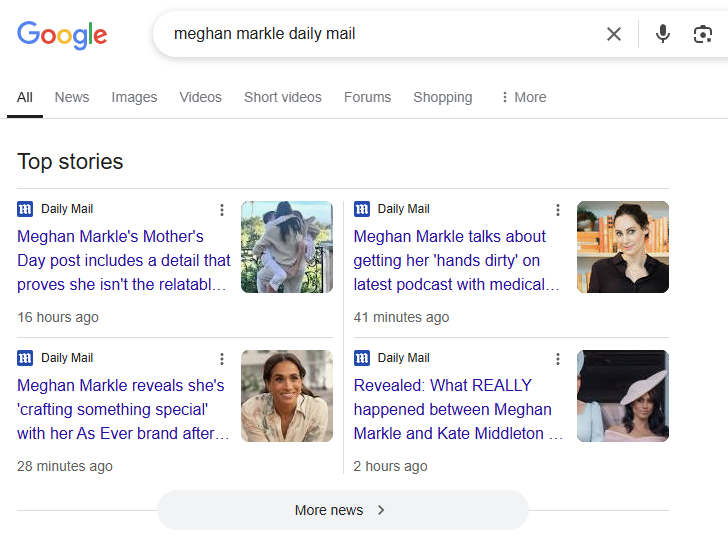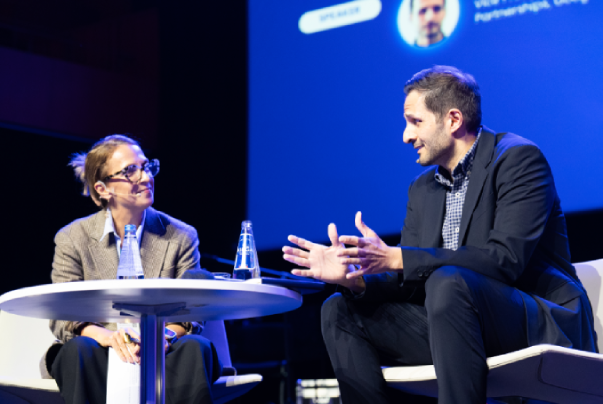
Mail Online is seeing a massive reduction in clickthrough rates from online search results when Google shows an AI summary for a keyword which the publisher ranks number one for.
Mail director of SEO and editorial e-commerce Carly Steven says sites like hers need to concentrate their efforts on the “most resilient” branded searches like “Meghan Markle Daily Mail” as well as content that AI cannot replicate such as columnists and live blogs since chatbots cannot yet keep up with the pace of breaking news.
She said: “Focusing on the brand has never, ever, ever been more important.”
A new survey published by SEO growth consultant Kevin Indig at the Growth Memo found: “Desktop outbound CTR can fall by two-thirds the moment an AIO appears; mobile fares better, but still loses almost half its clicks”.
Steven told the WAN-IFRA World News Media Congress in Krakow last week that the Mail worked with an SEO software company to look at the impact Google AI Overviews was having on 5,000 of the search keywords which it targets.
She said: “On desktop, when we are ranking number one in organic search, it [clickthrough] effectively is about 13% on desktop and about 20% on mobile. When we are still ranking number one organically but there is an AI Overview present, that drops to less than 5% on desktop and 7% on mobile, so a pretty profound change in clickthrough.”
Steven said that when a Google AI Overviews appears for a search query, the Mail’s average clickthrough rate was 56.1% lower on desktop and 48.2% lower on mobile. She described the drop as “pretty shocking”.
Even in the “best possible scenario” with Mail Online showing in the top link in AI Overviews, this still resulted in a 43.9% lower clickthrough rate on desktop while it was 32.5% lower on mobile.
“It’s a really profound impact on clickthrough rate,” Steven said. “So the immediate next question is what impact does that have on your traffic and who knows? Because they won’t tell us. They will not give us the data within our analytics tools… we’re in a very difficult situation where it’s actually really hard to quantify the actual impact that it’s having on traffic.”
Google has said that “links included in AI Overviews get more clicks than if the page had appeared as a traditional web listing for that query”.
But Steven argued: “I don’t think the data proves that out,” citing Similarweb data showing a “massive” increase in zero-click searches. She said searches ending without a click have also increased for non-AI Overviews keywords “but it’s nowhere near as much”.
She also cited the search term “Noor Alfallah news” referring to the film producer who had a child with actor Al Pacino before they broke up last year. Steven said: “There were about 18,000 searches in the US for this particular term. We were ranking number one in Google for it… it wasn’t driving loads of traffic for us but it drove about 6,000 clicks. [An] AI Overview appeared and it went down to 100. So the impact on clickthrough rate is really dramatic.”
Mail Online is the eighth biggest English language news website in the world, according to Similarweb, with some 260 million website visits per month (down 19.5% year on year in March 2025).
‘Branded’ searches ‘most resilient’ to Google AI Overviews
Steven said publishers need third-party tools to assess the impact AI Overviews but because the data is hard to find.
For example, she said, the Mail had some data that made it look like 20% of its “most valuable” keywords on mobile in the US had an AI Overview present, as well as 18% on desktop. In the UK, the figures were 11% for mobile and 12% for desktop. “But actually when we dig into this data a little bit more what we found was that it isn’t quite true.”
For example, citing the “Meghan Markle” keyword – a “big” one for Mail Online – the data said there was an AI Overview present but in fact it was only in the “People also ask” feature, which has less of an impact.
Steven said “that massively skews the perceived impact that AI Overviews is going to be having on your keywords. So that’s a little bit of good news…”
Steven recommended focusing efforts on high-frequency search terms that include the publisher’s brand: “We get thousands of clicks every single month from people searching for ‘Meghan Markle Daily Mail’, ‘Prince Harry Daily Mail.’ So they actively want to read stories about the royals but only on our website.”
She said that if this can be identified in the data, “that’s where you know where do you have this audience and where should we be concentrating effort is in these searches… where people are actively looking for you is the content that’s going to be most resilient to the AI Overviews”.

Google says AI Overviews are not triggered for hard news queries
Google vice president of news partnerships Jaffer Zaidi told the WAN-IFRA event that the platform sends millions of publisher clicks per day and will keep doing so even as AI Overviews grows.
He said AI Overviews are purposefully not triggered for hard news queries. SEO consultant Barry Adams of Polemic Digital told the conference that publishers whose search traffic is primarily generated by Top Stories boxes on Google rather than evergreen stories are “safe for now – safe-ish”.
Zaidi also said AI Overviews mean more searches in Google overall because satisfaction with the results they show is higher so people ask more. He also claimed they lead to better publisher value because users stay on websites longer after being referred from AI Overviews.

AI Mode: Google referral traffic ‘definitely in trouble’ if new feature becomes default
The Mail’s Carly Steven also warned about the arrival of AI Mode, which Google has said aims to be better at answering “nuanced questions that might have previously taken multiple searches”. It is currently in beta testing, available to all US users of Google Search Labs, the tech giant’s home for its AI experiments, for whom it is now “front and centre in the search bar”
Google AI Mode is akin to the more conversational answers provided by generative AI platforms such as ChatGPT.
[Read more: With launch of AI Mode Google threatens to bleed news media dry]
Although Google promises AI Mode answers will contain “links to learn more”, Steven shared a screenshot of a page about British teenager Jay Slater who went missing in Tenerife last year and was found almost a month later. The page gave a great deal of information and Steven said: “I don’t think anyone is going to be clicking on those links. It just answers it.”
In addition, she said, AI Mode does appear be used to answer hard news queries.
Steven said: “At the moment it is going to be a tab in the search results and it isn’t the default, but that could change very quickly and if that does become the default experience then I think referral traffic from Google is definitely in trouble.”
Google said at the start of May: “Because our power users are finding it so helpful, we’re starting a limited test outside of Labs. In the coming weeks, a small percentage of people in the US will see the AI Mode tab in Search…”
In her talk Steven also summarised the threats from Reddit and other social platforms appearing more often in Google’s Top Stories box, from the platform’s Site Reputation Abuse update affecting sites with voucher codes or affiliates businesses, and its frequent algorithm updates.
Overall she said: “Search traffic is going to decline, I think that’s inevitable and I think we have to be prepared for that. I think this ‘news is immune from AI’ is only going to last so long.
“I think even branded search which we can sort of take for granted – this ‘oh, well, if people are Googling Daily Mail they definitely want to come to the Daily Mail’, I’m not sure that’s true,” she added, referring to AI Mode.
Speaking at the PPA Festival in London a day after Steven’s presentation, Bauer’s global SEO director Stuart Forrest also gave a warning about AI Mode: “If you think that AI Overviews are bad for business and nibbling away at traffic, what you’re seeing here is AI Mode, and that threatens to eat it wholesale,” he said.
“We are probably heading towards the end of the era [of the link-based web], and we as publishers are going to have to find a different business model that allows us to monetise that content.”
Email pged@pressgazette.co.uk to point out mistakes, provide story tips or send in a letter for publication on our "Letters Page" blog
